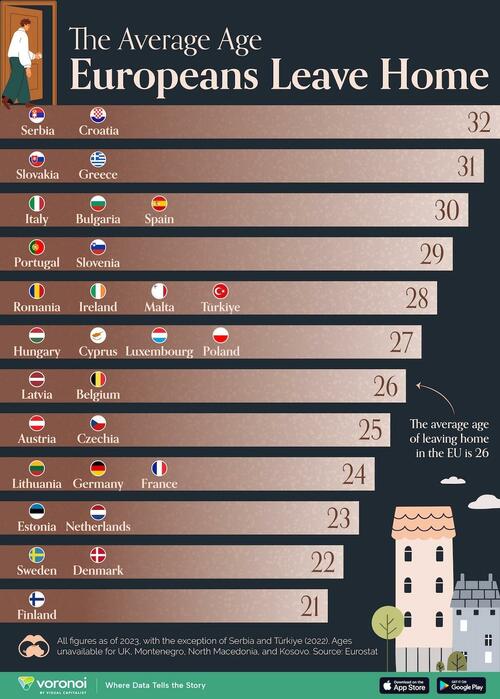
Leaving home and setting off to build one’s own life is considered a key pillar of adulthood in many countries.
It’s the proverbial mark at which societies deem a person fit and able to architect and maintain the trajectory of their own life.
However, as Visual Capitalist's Pallavi Rao shows below, not all cultures and family structures are the same. And sometimes economies can influence the ability to move out.
We rank the European countries by the average age at which people leave their parental homes, as sourced from Eurostat data, current up to 2023.
When Do Europeans Leave the Nest?
Balkan countries, and Southern Europe as a whole, likes to leave the parental nest a little later in life.
The average age for moving out in seven countries—all from the region—is either at or above 30.
| Country | Average Age Leaving Home (2023) |
|---|---|
| 🇭🇷 Croatia | 32 |
| 🇷🇸 Serbia* | 32 |
| 🇸🇰 Slovakia | 31 |
| 🇬🇷 Greece | 31 |
| 🇪🇸 Spain | 30 |
| 🇧🇬 Bulgaria | 30 |
| 🇮🇹 Italy | 30 |
| 🇵🇹 Portugal | 29 |
| 🇸🇮 Slovenia | 29 |
| 🇲🇹 Malta | 28 |
| 🇹🇷 Türkiye* | 28 |
| 🇮🇪 Ireland | 28 |
| 🇷🇴 Romania | 28 |
| 🇨🇾 Cyprus | 27 |
| 🇭🇺 Hungary | 27 |
| 🇵🇱 Poland | 27 |
| 🇱🇺 Luxembourg | 27 |
| 🇧🇪 Belgium | 26 |
| 🇱🇻 Latvia | 26 |
| 🇨🇿 Czechia | 25 |
| 🇦🇹 Austria | 25 |
| 🇱🇹 Lithuania | 24 |
| 🇩🇪 Germany | 24 |
| 🇫🇷 France | 24 |
| 🇳🇱 Netherlands | 23 |
| 🇪🇪 Estonia | 23 |
| 🇩🇰 Denmark | 22 |
| 🇸🇪 Sweden | 22 |
| 🇫🇮 Finland | 21 |
| 🇪🇺 EU | 26 |
*Data from 2022. Figures rounded. Ages unavailable for the UK, Montenegro, North Macedonia, and Kosovo.
Cultural factors (strong family bonds) and economic pressures (high rents compared to lower local wages) combine to influence higher moving out age in the region.
Another interesting correlation is how the same countries tend to have higher home ownership rates (Romania, Slovakia, and Croatia all above 90%) indicating that renting is not a popular choice for residents.
Multigenerational families are also more common across the region, a holdover from a more agricultural-oriented society, stronger Church, and weaker welfare state and institutions.
On the other hand, in Nordic countries, Finland, Sweden and Denmark, the average age of moving out is in the 21 to 22 range. Similarly, their home ownership rates are much lower in comparison.
If you liked this kind of content, check out The Top Export in Each EU Country for a national breakdown into the EU’s $6 trillion export list.
Leaving home and setting off to build one’s own life is considered a key pillar of adulthood in many countries.
It’s the proverbial mark at which societies deem a person fit and able to architect and maintain the trajectory of their own life.
However, as Visual Capitalist’s Pallavi Rao shows below, not all cultures and family structures are the same. And sometimes economies can influence the ability to move out.
We rank the European countries by the average age at which people leave their parental homes, as sourced from Eurostat data, current up to 2023.
When Do Europeans Leave the Nest?
Balkan countries, and Southern Europe as a whole, likes to leave the parental nest a little later in life.
The average age for moving out in seven countries—all from the region—is either at or above 30.
| Country | Average Age Leaving Home (2023) |
|---|---|
| 🇭🇷 Croatia | 32 |
| 🇷🇸 Serbia* | 32 |
| 🇸🇰 Slovakia | 31 |
| 🇬🇷 Greece | 31 |
| 🇪🇸 Spain | 30 |
| 🇧🇬 Bulgaria | 30 |
| 🇮🇹 Italy | 30 |
| 🇵🇹 Portugal | 29 |
| 🇸🇮 Slovenia | 29 |
| 🇲🇹 Malta | 28 |
| 🇹🇷 Türkiye* | 28 |
| 🇮🇪 Ireland | 28 |
| 🇷🇴 Romania | 28 |
| 🇨🇾 Cyprus | 27 |
| 🇭🇺 Hungary | 27 |
| 🇵🇱 Poland | 27 |
| 🇱🇺 Luxembourg | 27 |
| 🇧🇪 Belgium | 26 |
| 🇱🇻 Latvia | 26 |
| 🇨🇿 Czechia | 25 |
| 🇦🇹 Austria | 25 |
| 🇱🇹 Lithuania | 24 |
| 🇩🇪 Germany | 24 |
| 🇫🇷 France | 24 |
| 🇳🇱 Netherlands | 23 |
| 🇪🇪 Estonia | 23 |
| 🇩🇰 Denmark | 22 |
| 🇸🇪 Sweden | 22 |
| 🇫🇮 Finland | 21 |
| 🇪🇺 EU | 26 |
*Data from 2022. Figures rounded. Ages unavailable for the UK, Montenegro, North Macedonia, and Kosovo.
Cultural factors (strong family bonds) and economic pressures (high rents compared to lower local wages) combine to influence higher moving out age in the region.
Another interesting correlation is how the same countries tend to have higher home ownership rates (Romania, Slovakia, and Croatia all above 90%) indicating that renting is not a popular choice for residents.
Multigenerational families are also more common across the region, a holdover from a more agricultural-oriented society, stronger Church, and weaker welfare state and institutions.
On the other hand, in Nordic countries, Finland, Sweden and Denmark, the average age of moving out is in the 21 to 22 range. Similarly, their home ownership rates are much lower in comparison.
If you liked this kind of content, check out The Top Export in Each EU Country for a national breakdown into the EU’s $6 trillion export list.
Loading…





